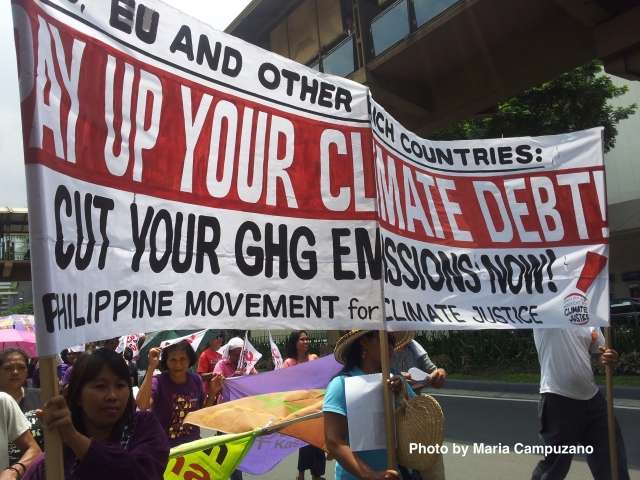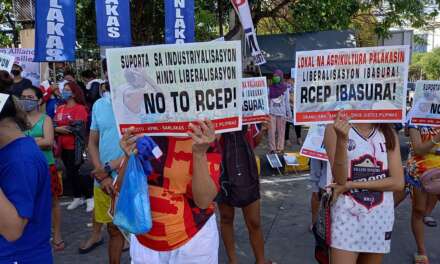Statement of the Philippine Movement for Climate Justice (PMCJ) on the occasion of the 1st Experts Meeting on Long Term Finance (LTF) under the United Nations Framework Convention on Climate Change (UNFCCC).
We, members of the Philippine Movement for Climate Justice (PMCJ), who came from the grassroots communities and basic sectors and are greatly affected by the irreversible impacts of climate change, strongly urged developed (Annex 1) countries to pay-up their climate debts now!
For centuries, these developed countries have polluted and snatched away from developing countries their fair and sustainable share of the atmosphere, emitting too much greenhouse gases to satiate their greed for profit. They have built countless destructive development projects all over the world like air-polluting factories, coal-fired power plants, nuclear power plants, mega dams and others. They have also pushed for policies allowing extractive industries to practice wasteful and irresponsible extraction of the Earth’s minerals. All of these have fast-tracked the devastation of the Earth’s ecological system that brought about unprecedented changes in the planet’s climate.
Since developed countries have contributed much to the problem and have stolen the rightful share of developing countries to the atmosphere, the former have incurred “climate debts” to the latter. Even worse is that while developing countries are low contributors to the problem, they bear the brunt of the impacts of climate change.
Like the way these developed countries (lenders) demanded debt payments from us, developing countries (borrowers), we demand now the payment of their “climate debts”. PMCJ reiterates the need to pay for the developing countries’ full incremental cost of doing climate adaptation and mitigation measures including the loss and damage from climate change impacts. This provision was based on the principle of common but differentiated responsibilities (CBDR) and historical responsibility enshrined in the United Nations Framework Convention on Climate Change (UNFCCC).
PMCJ’s demand is addressed to the high-level finance experts who will be participating in the First Experts’ Meeting on Long-term Finance (LTF) under the UNFCCC on July 16-17, 2013 at the Dusit Thani Hotel in Makati City. Philippine delegation representative, Commissioner Nadarev Saño, co-chairs the LTF with the representative from Sweden. This meeting will discuss the parameters of pathways for mobilizing scaled-up climate finance and examine enabling environments and policy frameworks in the context of mobilization and effective deployment of climate finance.
In this LTF Meeting, PMCJ will call on the experts to make it as their top priority the mobilization of funds from developed countries to developing countries as payment for their “climate debts”. The climate change-affected communities, marginalized and vulnerable sectors of farmers, fishers, indigenous peoples, rural/urban poor and women are one in demanding these to be paid-up.
PMCJ also urged the developed countries to cut their GHG emissions drastically in the most urgent time possible because no amount of money will be enough if GHG emissions continue to increase.
Currently, the Philippines is the front-liner in disaster impacts and topped the vulnerability rank. In fact, the Philippine Government has been losing annually an average of two (2) percent of its gross domestic product (GDP) due to damages caused by extreme weather events such as Typhoons Ketsana (Ondoy), Bopha (Pablo), Washi (Sendong) and Parma (Pepeng). Worst, the country lost both properties and lives. Many Filipinos have suffered because of these disasters and resources were wasted due to the unpreparedness and inadequacy of funds to address losses, damages and rehabilitation.
Lastly, PMCJ also demands the high-level finance experts to prioritize contributions for public funds rather than putting more money on the private sector facility – funds that are in the form of grants and not loans, and additional to existing development aids. Developed countries, led by the US and EU, are still pushing that the facility will hold funds to be used for leveraging private sector investments, thus putting bias in favor of private capital. This is an added obstacle in realizing the goal of mobilizing climate funds intended for the need of the vulnerable developing countries and communities given the current problem of inadequacy of the current pledges.
For PMCJ, most private sectors involved in the climate crisis do not offer solutions but to profit more.
As a network, we say NO to CLIMATE PROFITEERS!
*Focus on the Global South is a member of the Philippine Movement for Climate Justice.









